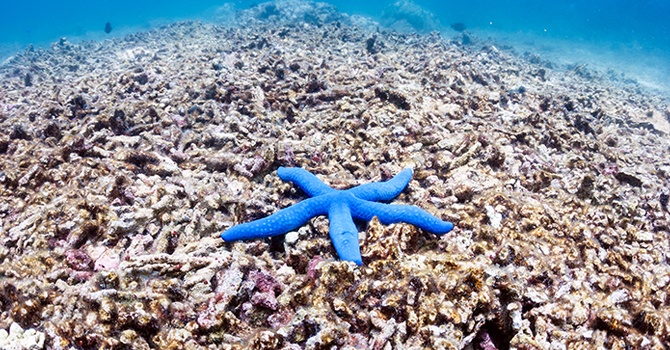The Organism-Environment Interface: How Epigenetics Can Help Us Understand the Impacts of Climate Change

Rachel Morgan
PhD Student in Environmental Health Sciences
Epigenetics is the study of heritable changes in gene expression without changes to the underlying DNA sequence. You can think of your genome as the hardware of a computer. A computer has the capability to create and modify a file containing text. Your epigenome is the software. While a computer may have this capability, it is the word processing program that dictates when, where, and how that document is modified. While the underlying genomic instructions are important, it is the epigenomic software that utilizes these instructions at the proper place and time.
The epigenomes of all organisms are thought to be much more responsive to environmental conditions than our genomes.
As individual epigenetic processes work in concert to ensure proper development and function, environmental stimuli can modify epigenetic mechanisms and subsequently change how our genomes function.1 The epigenomes of all organisms are thought to be much more responsive to environmental conditions than our genomes, which is why this field is of importance when we consider the dramatic changes in our environment, including those we are experiencing with climate change.
Numerous aspects of climate change can impact epigenetic factors. And as the climate changes, we will identify new influences that we will need to address.
Entire ecosystems are changing in response to climate change, and these changes can be traced to the modified epigenomes of organisms.
Temperature is an important epigenetic factor both on land and in water systems. Rising water temperatures mean less dissolved oxygen is available to fish. As a result, several fish species have experienced changes in their epigenome.2,3 Changes in ocean salinity and acidity—both closely linked to water temperature—place a great amount of stress on corals, which are an important habitat for many marine species and have also been shown to adapt via their epigenomes.4,5 As fish size and population numbers decrease to adapt, these changes in water temperature and habitat could have serious repercussions for food systems that depend on or involve fish. Entire oceanic ecosystems are changing in response to climate change, and these changes can be traced, at least in part, to the modified epigenomes of the organisms that live within them.
Increasing temperatures on land are also resulting in epigenomic responses from organisms,6,7 especially for plant species, which cannot adapt to environmental stressors by changing migration patterns or behavior. Climate change has resulted in dramatic alterations in rainfall patterns, with some regions of the world experiencing intense droughts and others receiving excessive amounts of precipitation. Plants must adapt quickly to these stressors as well. Food systems again become an area of interest, with crop viability depending on how quickly plants and plant growers can respond to environmental stressors brought about by climate change.
Any shift in any diet has the potential to impact the expression of our genes through epigenetic processes.
Discussion of climate change in the field of epigenetics has increased steadily in recent decades. Much of the research to date focuses on the concept of plasticity—how changes in plant or animal epigenomes allow them to respond to climate-related stressors in a more efficient manner than natural selection. Perhaps the most fascinating question in this work is transgenerational plasticity—whether the plasticity acquired in one generation can be passed down to the next.
How will plasticity by way of epigenetic alterations in response to climate change affect food accessibility? Will these adaptations be enough to maintain food sources such as crops, livestock, and fish populations? As we answer those questions, we will also have to observe how changes in food availability might lead to epigenetic adaptations of human populations. Those experiencing food shortages—developing nations and disadvantaged communities—will likely be the first to experience observable epigenetic alterations from dietary stress. But any shift in any diet, even if caloric intake remains steady, has the potential to impact the expression of our genes through epigenetic processes.
Added to food access concerns are the impact of increases in pollution that accompany climate change. Alterations in water composition due to temperature fluctuations and changes in rainfall patterns could draw out greater amounts of heavy metals from ground and infrastructure sources, resulting in greater human exposures and epigenetic consequences. Changes in temperature and rainfall is affecting air pollution levels and distribution, altering how and how often human populations are exposed to a range of chemical toxicants, many of which have been shown to cause or are suspected of altering the human epigenome.
The idea that our genes are not our destiny certainly fills the field of epigenetics with hope, because we have tremendous opportunities to create interventions that move us away from many negative health outcomes related to our genome. While these prospects are enticing, they are not an adequate replacement for tackling the irreversible changes currently happening to the planet. Meanwhile, our epigenome’s environmental sensitivity means climate change could lead to significant increases in animal and human suffering. Climate change poses a substantial risk for all organisms on Earth, due in large part to epigenetic modifications that may not support continued survival.
References
1. Head, Jessica A., Dana C. Dolinoy, and Niladri Basu, “Epigenetics for Ecotoxicologists,” Environmental Toxicology and Chemistry 31/2 (Feb 2012):221-227.
2. Lighten, Jackie, et al., “Adaptive Phenotypic Response to Climate Enabled by Epigenetics in a K-Strategy Species, the Fish Leucoraja ocellata (Rajidae),” Royal Society Open Science 3/10 (Oct 2016):160299.
3. Jonsson, Bror, and Nina Jonsson, “Egg Incubation Temperature Affects the Timing of the Atlantic Salmon Salmo salar Homing Migration,” Journal of Fish Biology 93/5 (Nov 2018):1016-1020.
4. Putnam, Hollie M., Jennifer M. Davidson, and Ruth D. Gates, “Ocean Acidification Influences Host DNA Methylation and Phenotypic Plasticity in Environmentally Susceptible Corals,” Evolutionary Applications 9/9 (Oct 2016):1165–1178.
5. Dixon, Groves, Yi Liao, Line K. Bay, and Mikhail V. Matz, “Role of Gene Body Methylation in Acclimatization and Adaptation in a Basal Metazoan,” Proceedings of the National Academy of Sciences 115/52 (Dec 2018):13342-13346.
6. Antoniou-Kourounioti, Rea L. et al., “Temperature Sensing Is Distributed throughout the Regulatory Network that Controls FLC Epigenetic Silencing in Vernalization,” Cell Systems 7/6 (Dec 2018):643-655.
7. Müller, M., and O. Gailing, “Abiotic Genetic Adaptation in the Fagaceae,” Plant Biology 21/5 (Sept 2019):783-795.
About the Author
 Rachel Morgan is a PhD student in Environmental Health Sciences at the University
of Michigan School of Public Health. She is part of the Environmental Toxicology and
Epidemiology Program (ETEP), a training grant funded by the National Institutes of Environmental Health Sciences.
She works in the lab of Dana Dolinoy, NSF International Chair of Environmental Health Sciences and Professor of Environmental
Health Sciences and Nutritional Sciences.
Rachel Morgan is a PhD student in Environmental Health Sciences at the University
of Michigan School of Public Health. She is part of the Environmental Toxicology and
Epidemiology Program (ETEP), a training grant funded by the National Institutes of Environmental Health Sciences.
She works in the lab of Dana Dolinoy, NSF International Chair of Environmental Health Sciences and Professor of Environmental
Health Sciences and Nutritional Sciences.
- Interested in public health? Learn more today.
- Read more articles about epigenetics and disease.
- Listen to the Population Health podcast episode about genetics.
- Support research at Michigan Public Health.
